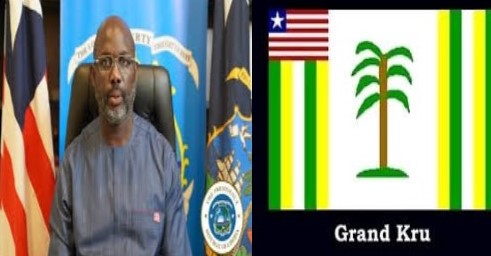PHOTO: Kru Man in Liberia’s Presidential Office: George Forkayklon Gbekugbe Manneh Weah
By Samuel G. Dweh, Freelance Development Journalist & president of the Liberia Association of Writers (LAW) Contacts —+231 (0)886618906/776583266/samuelosophy@yahoo.com/samuelosophy1@gmail.com
The Author of this article is of the County—a member of the County’s most “over-looked” ethnic group: Wedabo.
The purpose of this article is to stir the “developmental conscience” of the three “most prominent Liberian government officials” in the last three photos below.
The write-up ends with recommendations—suggested solution methods of how a County that currently “controls the Government and the entire Nation” can be in the leadership position national development.
Maryland showed how it can be done when a native of the County—William V.S. Tubman—was Head of State (1944-1971)
Grand Gedeh took the Nation’s developmental leadership position when an indigene of the County—Samuel Kanyon Doe—was Head of State (1980-1990)
Why isn’t Grand Kru County “leading” when an indigene of the County—George Manneh Weah—is the Head of State?
Anticipating questions from people on my “personal contributions” to the development of the County, I have added information about some of my intellectual productions (Books) somewhere in the article.
A FLASH OF THIS GRAND KRUAN’S “NATIONAL LEADERSHIP ROLE” RECORDS
The writer of the article you are about to read holds a record as the first High School student (12th grader) who taught President Ellen Johnson’s university-degree-holding speechwriter on “grammatical constructions” in the President’s Independence Day’s speech (2011) He was a proofreader at the Daily Observer newspaper.
He repeated same with President George Manneh Weah’s university-degree-holding speechwriter on “grammatical constructions” in the President’s speech sent to the 75th Meeting of the United Nations General Assembly (2020)
Link to a published article on each President’s ‘grammatically stained’ speech: https://smartnewsliberia.com/liberias-national-english-handicap-other-proofs-in-president-george-weahs-written-speech-to-the-un-general-assembly-2020/
The errors in each President’s speech were products of “ignorance” of the speechwriter on knowledge of the grammatical constructions each person erred in.
My proffered ‘way out of poor grammar knowledge’—to each speechwriter in the referenced article above—is “extensive reading”, especially Books on the Queen’s Language.
GRAND KRU COUNTY’S “LEADERSHIP ROLE” IN AFRICA
The County did it first through Plenyono Gbe Wolo (of Grandcess) on his being the first African that graduated from Harvard University (USA) in 1917.
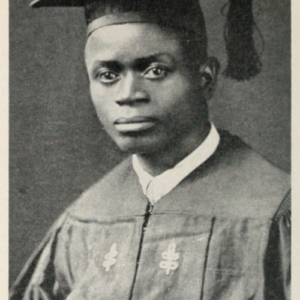
Grand Kruan (Plenyono Gbe Wolo): The First African that graduated from Harvard University (USA)
A label under the graduate’s photo (above), from Google.com, says: “Born in the Kru Coast, Liberia. Received the degree of A.B. from Harvard University, and A.M. from Columbia, and graduated from Union Theological Seminary, New York City”
A report in the University’s Archives—published on May 22, 2019—states: “In 1917 Plenyono Gbe Wolo of Grandcess, Liberia, became the first African to graduate from Harvard University. The son of a Kru Chief, Wolo was known as the “African Prince” among his classmates and caught the attention of local newspapers”
A comment on wooden plaque (under the Harvard University’s report) announces: “Plenyono Gbe Wolo Will Return to Liberia as Physicist and Chemist”
In 1995, Grand Kru County became Africa’s first on winning the World’s Best Footballer title through George Forkayklon Gbekugbe Manneh Weah (of Sasstown)

Grand Kruan (George Manneh Weah): First African that won “World’s Best Footballer” Award (1995)
GRAND KRU COUNTY’S GOVERNMENTAL LEADERSHIP OF LIBERIA
On January 22, 2018, George Forkay Klon Gbekugbe Manneh Weah—holder of a Master’s Degree in Business Administration—was inaugurated as Head of State of Liberia, after a four-year national service in the Senate (for Montserrado County) Some Grand Kruans consider his Senatorial service as ‘partially representing Grand Kru County’.
A Geologist, Mr. Albert Tugbe Chie (of Grandcess), was elected into Liberia’s Senate in 2014, and later won the presidential position of the Liberian Senate.
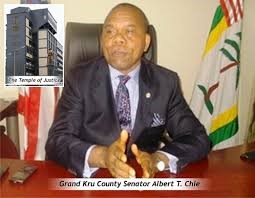
President Pro Tempore of Liberia’s Senate Albert Tugbe Chie
A Lawyer of international stature, trained in the United State of America, Attorney Jonathan Fonati Koffa (of Sasstown) was elected Representative of District #2 of Grand Kru County in 2017. He was elected Deputy Speaker of the House of Representatives in 2020
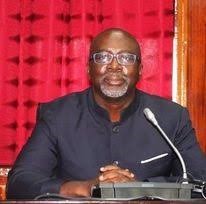
Deputy Speaker of Liberia’s House of Representatives Jonathan Fonati Koffa
Other academically superior Grand Kruans who had held top position in Government are: Cletus Wotorson (Geologist), former President of the Liberian Senate; and Peter S. Coleman (Surgeon), of the Liberian Senate (replaced with Mr. Numene Bartekwa on the Senate in 2020)
GRAND KRU’S CURRENT “CURSES”
The first is categorized as “physical infrastructure”—road, electricity, pipe-borne water, and health center.
Road: Roads connecting most parts of the County are deplorable—bush on the road, gutter or ditch dot the road. In the remotest parts, there’s creek on the road and connection of one Town with another is only by logs (sticks) that are replaced after three years due to damage. In some parts, the ‘bridge’ is one stick stretching over elongated creek, forcing travelers to hold sticks for balance of their weights to prevent fall into the water. I did same during my tours of the County during the Presidential and HOR elections in 2017. No part of the County has asphalt (tarred) road, stretching over three decades. Journey in vehicle through the County causes the worst nightmare for drivers of cars than it is in other Counties. The deplorable road conditions discourage owners of vehicles to venture into the County. This causes movements on legs—over hundreds of miles—by majority of people in the County, which resulted to this part of Liberia being referred to “Grand Walking County” (a title coined by residents and visitors between the start of Liberia’s civil war, 1990, up to present—15 years after the civil war)
Electricity: For now only President George M. Weah’s quarter (Sasstown) has electric light, installed weeks to the President’s first-time familiarization visit to the County (February, 2021) as part of his nation-wide tour in the same month.
Pipe-borne water: There’s no water pipe anywhere in the County. Majority of the residents depend on creeks and ponds for their drinking water—most times contaminated with faeces of animals and some of the locals. Some visitors whose sachet or bottle water (taken along from other Counties) have to survive on these contaminated creeks and ponds.
Health Center: There are only two Hospitals in the County (record of March 16, 2021)—one in Sasstown; one in Grandcess. However, each refers ‘critical cases’ to Maryland County’s Health Center (J.J. Dossen Memorial Hospital) because doctors at each of these two hospitals are not medically equipped sufficiently to handle these ‘heavyweight cases’. The absence of Ambulance is salt to the ‘medical injury’ of the County, which compels the County’s health authorities to convey some ‘critically ill’ patients on motorbikes—sometime in heavy rain or or scorching sun.
The other treatment centers are “Clinics”—each with life-threatening problems of quackery (medical incompetence of persons giving drugs or drilling needles into sick people’s skin) and presence of fake/substandard drugs smuggled into the County (to fill gap of real drugs scarcity)
The second “curse” is educational. Grand Kru County’s performance, through her students at the grade-level, has been the “poorest”. Example: The County has been leading other Counties on the highest number of students that failed West African regional exams—West African Examination Council (WAEC) and West African Senior Secondary Certificate Examinations (WASSCE) since the introduction of these exams categories. Examples: All representatives of all the County’s High Schools failed in all the subjects at the 2016’S edition of WAEC’s exams. (The County’s Legislative Caucus blamed the Minister of Education—George Werner—a Grand Gruan-on the mass failure) In the next edition of WAEC (2017) only two students—Kieh Wisseh and Fred Wesseh (of Barclayville Central High School) passed (with eight subjects including English and Mathematics), out of 133 students from all the County’s High Schools. The 111 students couldn’t pass, in spite of the teaching presence of U.S. Peace Corps members hired by the Liberian Government of Madam Ellen Johnson-Sirleaf.
None of County’s 12th grader got a pass mark in the 2020’s edition of WASSCE.
“No student passed, at least to my knowledge,” the County’s Superintendent, Madam Doris N. Ylatun, replied to my query when gathering educational information for this article.
“For Science subjects.how will the County’s 12th graders pass WAEC or WASSCE when there are no Science laboratory for them to see the machine whose parts they are going to describe in the exams hall,” Mr. Jefferson N. Toe, a High School Teacher in Sasstown, posed a rhetorical question to me during our discussion on the “mass failure on WASSCE” in February, 2021.
The academic performances of the (majority) of Grand Kruans in each of (Liberian) universities are “discouraging”. According to may employer, most of the County’s University graduates who are bragging with their university degrees cannot defend the papers during oral presentation or with written communication—so they are not accepted for jobs in Government or the private sector—where their colleagues from other Counties are being hauled due to their “academic competence”. So, these Grand Kruans have resorted to “political praise-singing” (for President Weah or a Legislator) as a “survival method”. For those still in university, it’s “gowning” of a County’s politician who won election in recent time.
Due to its deplorable road conditions and absence of social amenities, Grand Kru County doesn’t appear on the ‘assistance list’ of majority of Liberia’s International Development Partners’ representatives who are used to ever-flowing electricity, driving on tarred roads, drinking clean water, and prefer supporting an effective, corruption-free educational system.
On collaboration of all Grand Kruans to solve the County’s chronic educational problem, I have no feeling of “practical interest” from any of the County’s members (Representatives or Senators) toward Grand Kruans who are not in their political circle. My feeling is based on my personal experience with each of the County’s Lawmakers of the 54 Legislature and current Legislature.
In 2016, I embarked on writing of a Literature Text Book (fictional story), titled “Grade Sin”—depicting problems in Liberia’s High School setting (including bribery for free grade/promotion) and proffered solution methods (through the characters’ actions) I decided to give FREE copies to all the County’s High Schools to fill the gap created by scarcity of Literature Text Books in the County during that time. I wrote all the County’s Lawmakers for financial support to publish the Book. None responded to my letter (personally delivered) Mr. Crayton O. Duncan (of Sinoe County), Personal Assistant to Central Bank Governor, Mr. Mill Jones, came to my rescue with seventy United States Dollars (USD70) to print “sample copies”; I produced seven copies at USD10 per copy
When the Book—16 chapters—was out, I gave one copy to each of my County’s Lawmakers (the same people who didn’t respond to my appeal letter) But none of them said “Thank you” for the FREE copy.
Two years later, I sent a FREE first edition copy of my 12-page education newspaper—Edu-Diary (with stories on the County’s two male students that passed 2017’s WAEC )—to each of the same Grand Kru County’s Lawmakers, telling him (in the accompanying letter) my plan to always feature the County’s educational sector in subsequent editions and train the County’s High Schools’ students on media writing and literary writings and to publish their stories in the newspaper. But none of them said “Thank you” (in spoken or written words) for the FREE copy.
I had suggested to the County’s current Superintendent, Madam Doris Nyanplane Ylatun, on the need of establishment of educational scholarship in memory of this academically outstanding Son of the County. To be established by the County’s Legislative Caucus, in partnership with the Superintendent’s Office, will be restricted to the County’s students who passed with highest grade points in the West African Examination Council (WAEC) exams, or the West African Senior Secondary School Certificate (WASSCE) exams.
I had shared this suggestion with some members of each Legislator’s Office Staff—after each of my several attempts to personally speak to each Lawmaker yielded no result. I met a “blockade” of “personal security officers” or “Chief of Office Staff (COS)” who either told me the Honorable Man was “too busy and can’t speak with anybody now” or didn’t relay my message to the “too busy” Legislator. (I felt weak to translate my idea into word for each Legislator because none had responded to any of my written and personally hand-delivered communications—on innovative educational project for the entire County—since 2011)
In 2019, my professional group—Liberia Association of Writers (LAW)—wrote all Grand Kru County’s Lawmakers (Representatives and Senator) to support LAW’s three-week Workshop on training in writing for Grand Kru County’s Junior and Senior students. None of the Lawmakers responded to his letter personally delivered by me—LAW’s president.
Each of my several attempts of reaching (via letters and comments on his Facebook page) Representative Jonathan Fonati Koffa—the new man in Grand Kru’s Legislative Caucus—has ended “fruitless”: He has never replied.
DIVISION IN GRAND KRU COUNTY’S LEGISLATIVE: MAIN CAUSE OF THE COUNTY’S “CURSE”
There are many political rifts in the group of Representatives and Senators that makes up what is known as Grand Kru’s Legislative Caucus.
My first connection with this “crack” was when I was in the County during Liberia’s Presidential and House of Representatives elections in 2017. It was based on support to a Presidential Candidate. George Wesseh Blamoh, out-going Representative of District #1, was for Presidential Candidate (Senator) George Manneh Weah of the Coalition for Democratic Change (CDC) In fact, he was the Party’s Campaign Manager” in the County. Assisted by Madam Doris N. Ylatun (now Superintendent of the County), he traversed most of the County, especially the part inhabited by ethnic group, Wedabo, preaching George Weah as the “best Presidential material for Liberia” The others Legislators were behind incumbent Vice President, Joseph Nyumah Boakai, of the ruling Unity Party (UP), for the Presidency. There were reports that the VP gave ten million Liberian Dollars to Mr. Blamoh’s ‘political opponents’ to win the hearts of other Grand Kruans towards him.
Then something shocking happened: The Manager of the County’s only community radio station was mysteriously suspended by the County’s Superintendent, Madam Elizabeth Dempster, day after he hosted the CDC’s “Campaign Manager”. My investigation in the County revealed that her appointment as Superintendent was a result of Representative Blamoh’s pleading to President Sirleaf, but she got politically closer to the pro-Joseph N. Boakai ‘trio’—Senators Albert Tugbe Chie and Peter S. Coleman and Representative Numene Bartekwa.
Political conflict between the 2017’s entry, Nathaniel N. Bahway (Representative of District #1) and the “old bloc” (against Mr. George Wesseh Blamoh) is another proof of political division in the County’s Legislative Caucus. The rift is the trio’s published debunk (see INQUIRIER Newspaper of June 1, 2020, page 10) to alleged claim by of Hon. Bahway that a feeder road (under the Big Suen-Juduken Project) is his personal project. The trio said the road was constructed by the Swedish Government through the Swedish International Development Agency (SIDA)
Some of the County’s journalists are contributing to the political rift. For example, the editorial team of Grand Kru Monitor, the County’s assumed flagship newspaper, left out only Representative Nathaniel N. Bahway in the maiden edition produced in September, 2020. (I had expressed my reservation on the bias and grammatical errors with the edition)
RECOMMENDATIONS
Head of State George Forkay Klon Gbekugbe Manneh Weah should invite his private business partners outside of Liberia to come to invest in his County. Government’s budgetary allocation for Grand Kru County won’t be enough. The development of the County will pull most—if not all—Grand Kruans to your “second Term” Presidential campaign, and will be another of your presidential legacies in Liberia.
Senate President (Albert Tugbe Chie) and Deputy Speaker (Jonathan Fonati Koffa) should begin “political reconciliation” of the entire County. One way to do this is to convene a County’s Conference where Grand Kruans will download any hurts they are carrying on their hearts. A wounded heart is a hindrance to development. Another task is to convene all professional groupings of the County—residing in or living out—to contribute their quota to the development of the County. Many of the County’s professionals want to assist, but they don’t have the financial means.
Non-governmental professionals of Grand Kru County should keep themselves from “political attacks” (against the Head of State or the Legislators)—done to attract attention or to satisfy one’s political benefactor against his/her political opponent. Political attack is one of the major factors causing “grudge” in the Head of State, the Senate President or the Deputy House Speaker against people who are yearning for financial help to do something for the County.
Who told you the “curse” of Grand Kru County can’t be ‘healed’?
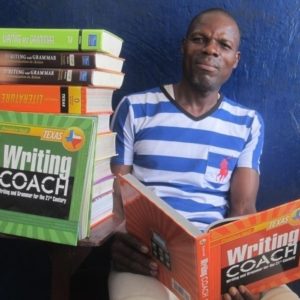
About the Author:
Samuel G. Dweh is a member of the Wedabo ethnic group of Grand Kru County, situated in the South-Eastern part of Liberia. He’s a member of the Press Union of Liberia (PUL), and President of the Liberia Association of Writers (LAW) He can be reached via: —+231 (0)886618906/776583266/samuelosophy@yahoo.com

